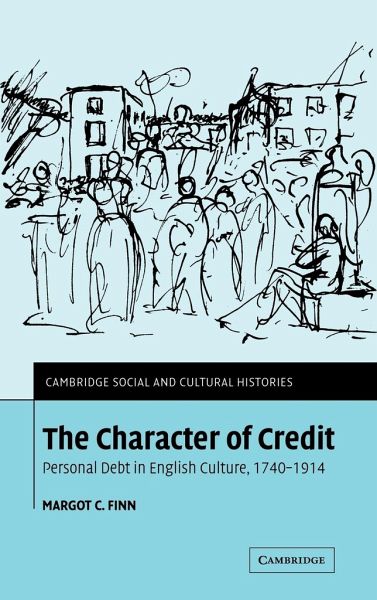
The Character of Credit
Personal Debt in English Culture, 1740 1914

PAYBACK Punkte
60 °P sammeln!
An exploration of personal credit and debt in English society from 1740 to 1914.Personal credit relations were ubiquitous in English consumer markets, binding family members, friends, neighbours, customers and tradesmen in tangled lines of mutual obligation. In this study of the social history of personal debt and credit, Margot Finn reveals the pre-eminence of social individuals - men, women and children whose ability to engage in credit contracts was contingent upon their dependent social status. Using a wide range of printed and manuscript sources, and paying particular attention to distinc...
An exploration of personal credit and debt in English society from 1740 to 1914.
Personal credit relations were ubiquitous in English consumer markets, binding family members, friends, neighbours, customers and tradesmen in tangled lines of mutual obligation. In this study of the social history of personal debt and credit, Margot Finn reveals the pre-eminence of social individuals - men, women and children whose ability to engage in credit contracts was contingent upon their dependent social status. Using a wide range of printed and manuscript sources, and paying particular attention to distinctions of gender and of class, Finn examines English consumer culture from three interlocking perspectives: representations of debt in novels, diaries and autobiographical memoirs; the transformation of imprisonment for debt; and the use of small claims courts to mediate disputes between debtors and creditors. This major new study of personal debt from 1740 to 1914 will appeal to social, legal and cultural historians, literary scholars and those interested in the history of consumer culture.
Table of content:
Introduction; Part I. Debt and Credit in English Memory and Imagination: 1. Fictions of debt and credit, 1740-1914; 2. Debt and credit in diaries and autobiographies; Part II. Imprisonment for Debt and the Economic Individual: 3. 'Mansions of Misery': The unreformed debtors' prison; 4. Discipline or abolish? Reforming imprisonment for debt; Part III. Petty Debts and the Modernisation of English Law: 5. 'A Kind of Parliamentary Magic': eighteenth-century courts of conscience; 6. From courts of conscience to county courts: small claims litigation in the nineteenth century; 7. Market moralities: tradesmen, credit and the courts in Victorian and Edwardian England; Conclusion.
Personal credit relations were ubiquitous in English consumer markets, binding family members, friends, neighbours, customers and tradesmen in tangled lines of mutual obligation. In this study of the social history of personal debt and credit, Margot Finn reveals the pre-eminence of social individuals - men, women and children whose ability to engage in credit contracts was contingent upon their dependent social status. Using a wide range of printed and manuscript sources, and paying particular attention to distinctions of gender and of class, Finn examines English consumer culture from three interlocking perspectives: representations of debt in novels, diaries and autobiographical memoirs; the transformation of imprisonment for debt; and the use of small claims courts to mediate disputes between debtors and creditors. This major new study of personal debt from 1740 to 1914 will appeal to social, legal and cultural historians, literary scholars and those interested in the history of consumer culture.
Table of content:
Introduction; Part I. Debt and Credit in English Memory and Imagination: 1. Fictions of debt and credit, 1740-1914; 2. Debt and credit in diaries and autobiographies; Part II. Imprisonment for Debt and the Economic Individual: 3. 'Mansions of Misery': The unreformed debtors' prison; 4. Discipline or abolish? Reforming imprisonment for debt; Part III. Petty Debts and the Modernisation of English Law: 5. 'A Kind of Parliamentary Magic': eighteenth-century courts of conscience; 6. From courts of conscience to county courts: small claims litigation in the nineteenth century; 7. Market moralities: tradesmen, credit and the courts in Victorian and Edwardian England; Conclusion.














